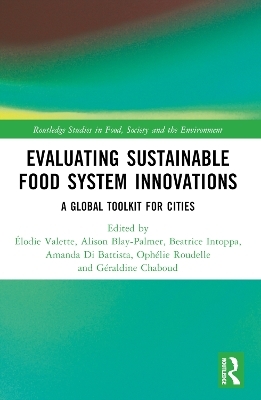
Evaluating Sustainable Food System Innovations
Routledge (Verlag)
978-1-032-25883-6 (ISBN)
- Lieferbar (Termin unbekannt)
- Versandkostenfrei innerhalb Deutschlands
- Auch auf Rechnung
- Verfügbarkeit in der Filiale vor Ort prüfen
- Artikel merken
This book presents Urbal, an approach that applies impact pathway mapping to understand how food system innovations in cities, and their territories, change and impact food system sustainability.
Around the world, people are finding innovative ways to make their food systems more sustainable. However, documenting and understanding how these innovations impact the sustainability of food system can be a challenge. The Urban Driven Innovations for Sustainable Food Systems (Urbal) methodology responds to these constraints by providing innovations with a simple, open-source, resource-efficient tool that is easily appropriated and adaptable to different contexts. Urbal is designed to respond to the demands of field stakeholders, whether public or private, to accompany and guide them in their actions and decision-making with regard to sustainability objectives. This book presents this qualitative and participatory impact assessment method of food innovations and applies it to several cases of food innovation around the world, including the impact of agricultural districts in Milan, chefs and gastronomy in Brasilia, e-commerce in Vietnam, eco-friendly farm systems in Berlin and the Nourish to Flourish governance process in Cape Town. The book demonstrates how food innovations can impact different dimensions of sustainability, positively and negatively, and identify the elements that facilitate or hinder these impacts. The volume reflects on how to strengthen the capacity of these stakeholders to disseminate their innovations on other scales to contribute to the transition towards more sustainable food systems.
This book will be of great interest to students and scholars working on sustainable food systems, urban food, food innovation and impact assessment, as well as policymakers, practitioners and funders interested in these areas.
Élodie Valette is a geographer and a senior researcher at CIRAD (French Agricultural Research for Development) in Montpellier, France. She is the coordinator of the Urbal project. Alison Blay-Palmer is the UNESCO Chair in Sustainable Food Systems, the founding director of the Laurier Centre for Sustainable Food Systems, and a professor at Wilfrid Laurier University, Canada. She is the co-editor of Sustainable Food System Assessment (Routledge, 2019) and the scientific coordinator of the Urbal Project. Beatrice Intoppa is a project manager at the UNESCO Chair in World Food Systems at L’Institut Agro Montpellier, France. She holds an MA in Local Development from the University of Padua, Italy. Amanda Di Battista is the project coordinator of the Laurier Centre for Sustainable Food Systems, Canada. She produces the Handpicked: Stories from the Field podcast and is the co-editor of Food Studies: Matter, Meaning, Movement (2022) and Sustainable Food System Assessment (Routledge, 2019). Ophélie Roudelle is a project manager at the UNESCO Chair in World Food Systems in L’Institut Agro Montpellier, France. She is in charge of the valorization, dissemination, and popularization of research results of the Urbal project. Géraldine Chaboud holds a PhD in economics from Université de Montpellier, France, and has been a former project manager at the UNESCO Chair in World Food Systems in L’Institut Agro Montpellier, France.
1. Mapping change: The Urbal approach
Elodie Valette, Alison Blay-Palmer, Olivier Lepiller, and Amanda Di Battista
2. Urbal: A research project
Alison Blay-Palmer, Elodie Valette, Olivier Lepiller, and Amanda Di Battista
3. The role of chefs and gastronomy in transforming the Brasília food system
Jessica Pereira Garcia, Mauro G. M. Capelari, Stéphane Guéneau, Tainá Bacellar Zaneti, and Janaína D.A.S. Diniz
4. Traditional tortillas in Mexico: Opportunities and challenges for producers and consumers
Héloïse Leloup and Julie Le Gall
5. The role of school canteens in building more sustainable food systems: The impact pathways of the "Ma Cantine Autrement" programme in Montpellier
Marlène Perignon, Olivier Lepiller, Beatrice Intoppa, Elodie Valette, Ophélie Roudelle, and Amélie Wood
6. The potential of short food supply chains for sustainable urban agri-food systems: The UFIL of Milano Ristorazione
Giulia Bartezzaghi and Federico Caniato
7. Studying the impact of e-commerce on the sustainability of food systems in Vietnam
Michaël Bruckert, Olivier Lepiller, Denis Sautier, Nguyen Thi Tan Loc, and Nguyen Thi Sau
8. Ecofriendly farmsystems: Testing the Urbal approach in Berlin
Lucas Hövelmann and Undine Giseke
9. Agricultural Districts as tools for sustainable urban food systems: the case of Milan
Valerio Bini and Giacomo Zanolin
10. The Urbal approach and the after-life of a food systems innovation process: The Nourish to Flourish governance process in Cape Town, South Africa
Gareth Haysom and Jane Battersby
11. Using Urbal to develop metrics for evaluation
Beatrice Intoppa and Elodie Valette
| Erscheinungsdatum | 07.11.2023 |
|---|---|
| Reihe/Serie | Routledge Studies in Food, Society and the Environment |
| Zusatzinfo | 9 Tables, black and white; 21 Line drawings, color; 10 Halftones, color; 31 Illustrations, color |
| Verlagsort | London |
| Sprache | englisch |
| Maße | 156 x 234 mm |
| Gewicht | 453 g |
| Themenwelt | Naturwissenschaften ► Biologie ► Ökologie / Naturschutz |
| Sozialwissenschaften ► Soziologie ► Spezielle Soziologien | |
| Technik | |
| Weitere Fachgebiete ► Land- / Forstwirtschaft / Fischerei | |
| ISBN-10 | 1-032-25883-7 / 1032258837 |
| ISBN-13 | 978-1-032-25883-6 / 9781032258836 |
| Zustand | Neuware |
| Informationen gemäß Produktsicherheitsverordnung (GPSR) | |
| Haben Sie eine Frage zum Produkt? |
aus dem Bereich


